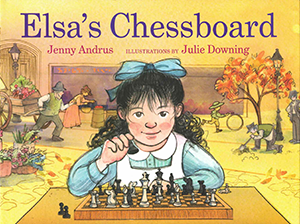Elsa’s Chessboard by Jenny Andrus with illustrations by Julie Downing; Neal Porter Books, an Imprint of Holiday House Publishing; © 2025; ISBN 9780823-454082; 36 pages; $18.99.

 SAN DIEGO – This book serves a double purpose: it is a tribute to the author’s Austrian Jewish grandmother and an introduction for children ages 4 to 8 to the exciting world of chess.
SAN DIEGO – This book serves a double purpose: it is a tribute to the author’s Austrian Jewish grandmother and an introduction for children ages 4 to 8 to the exciting world of chess.
As a young girl, Elsa Konstadt watched her older brothers play chess against each other. At last, one taught her how each chess piece moves. From that point on, she and her portable chess board were inseparable. Chess became Elsa’s passion. When she wasn’t playing the game, she was studying or thinking about it.
As she grew older, chess remained Elsa’s constant companion. The librarian who found her books on chess ended up becoming Elsa’s husband. When Nazi Germany and Austria united, Elsa and Edmund Weisz decided the country was no longer safe for Jews. They immigrated by boat with their daughter to the United States, travelling by train across the country to San Francisco, where they made their home.
Elsa worked in a dress factory, where the workers spoke many languages. Many of them knew how to play chess, so that was their way to communicate. Lunchtime breaks were Elsa’s happy times because she engaged in chess games with her coworkers. After work and on weekends, she taught other women how to play chess.
After Edmund died, Elsa moved into her daughter’s house, but the portable chess board she had since childhood was missing. Elsa played games with her grandchildren, including dreidel at Chanukah, but never chess. After some years, a great-grandson built a fort in a dark corner of the garage. The portable chess board tumbled from a stack of boxes.
Overjoyed at seeing it again, Elsa agreed for the first time in many years to play chess – with her great grandson Nick. The family gathered around the table to watch.
Illustrations by Julie Downing make picturing Elsa’s life journey easy.
*
Donald H. Harrison is publisher and editor of San Diego Jewish World.